#HMSSoftware
Explore tagged Tumblr posts
Text
HMS Software: Best Way to Handle Hospital Work Smoothly
HMS software helps hospitals work faster and smarter by handling tasks like patient records, billing, staff shifts, and appointments. It reduces paperwork and errors, improves care, and keeps everything in one secure place. Whether it's a small clinic or a large hospital, HMS software makes daily work simple and organized. This article explains how HMS software works and why it’s helpful for healthcare centers.
What Is HMS Software?
Hospital Management System (HMS) software is a tool that helps hospitals do their daily work in a better and faster way. It is used to manage everything from patient details and appointments to billing and medicine stock. Before HMS software, hospitals used papers and files for everything, which caused delays, mistakes, and lost records. With HMS software, all information is stored safely in one place and can be accessed anytime by the staff and doctors. It helps everyone do their job more easily, without wasting time.
What Can HMS Software Do
1. Easy Patient Registration and Records:
When a patient comes to the hospital, the first step is registration. HMS software helps the front desk staff register patients quickly by entering their basic details like name, age, phone number, and health issue. Once saved, this information is stored permanently and can be used later by doctors during check-ups. It also saves past visit history, lab reports, and prescriptions so doctors can understand the patient better.
2. Smooth Appointment Scheduling:
HMS software makes it simple for hospitals to schedule appointments. Patients can call the hospital, visit the front desk, or book online if the system is connected to the website. The doctor’s schedule is also updated in the software, so no two appointments clash. It shows available time slots, which helps avoid long waits and confusion.
3. Billing and Payment Tracking:
HMS software creates bills automatically based on the patient’s treatment, tests, and medicine. The system adds everything and shows the total amount. It also keeps track of payments made and balances due. If the patient has insurance, the software helps process the claim easily. This way, billing is quick, accurate, and transparent.
4. Pharmacy and Inventory Management:
In every hospital, keeping track of medicines is very important. HMS software monitors how many medicines are in stock and alerts the staff when something is running low. It also records when medicines are given to patients. This prevents misuse and helps hospitals avoid stockouts or expired medicines.
5. Lab and Test Report Handling:
Doctors often request lab tests like blood tests or X-rays. With HMS software, these requests are sent to the lab directly. Once the tests are done, the results are uploaded into the system and attached to the patient’s file. The doctor can then see the reports immediately without waiting for paper copies.
6. Staff and HR Management:
HMS software also helps manage the hospital staff. It tracks attendance, working hours, leaves, and salaries. It also stores employee details and shift timings. This helps the HR team handle everything in an organized and fair way without using separate systems.
How HMS Software Helps in Emergency Situations
In emergency situations, hospitals need to act fast. HMS software helps speed up the process. As soon as a patient enters, they can be registered quickly. If the patient has visited the hospital before, doctors can check their past records instantly to understand their health history. The software also shows which doctors and nurses are available, and which beds are empty. Lab tests and medicine requests can be sent directly through the system, saving valuable time. Billing and admission also happen quickly, so treatment can start without delay. This fast and organized method helps save lives and avoid confusion during critical moments.
Features of HMS Software That Help Every Day
Dashboard View:Shows all important hospital updates in one place like total patients, today’s appointments, and doctor availability.
Online Appointment Booking:Patients can book appointments through a website or mobile app and get automatic reminders.
Doctor Panel:Doctors can view their schedule, patient history, write notes, and check test reports easily.
Automatic Billing:Bills are created quickly based on treatments, tests, and medicines—saving time and reducing errors.
Medicine Tracking:Keeps an eye on medicine stock and sends alerts when items are low or about to expire.
Staff Shift Management:Helps assign and track staff duties, leaves, and shifts so everyone knows their schedule.
Mobile Access:Doctors and staff can log in from smartphones or tablets to view or update records anytime.
Data Security and Backup:Patient and hospital data is safely stored, with regular backups to prevent loss or misuse.
Conclusion
HMS software is an easy and helpful tool for any hospital or clinic. It keeps everything in one system from patient care and billing to medicine stock and staff duties. It helps save time, reduce mistakes, and improve the way hospitals serve patients. Hospitals that use HMS software work more smoothly, give better care, and stay organized every day. If you're running a hospital or clinic, HMS software can make your job much easier.
Visit Grapes innovative solutions to learn more about our easy-to-use HMS software.
Frequently Asked Questions
Can HMS software manage both outpatient and inpatient records?Yes. HMS software handles both OPD (outpatient) and IPD (inpatient) details. It stores all treatments, test results, and doctor visits for easy access.
Is patient information safe in HMS software?Yes. The software uses password protection, secure access, and data backup to keep all information safe and private.
Can doctors and staff use HMS software on mobile? Yes. Most HMS software works on mobile phones, so doctors and staff can check patient data anytime, even if they’re not in the hospital.
#HMSsoftware#HospitalManagement#MedicalSoftware#HealthcareSystem#ClinicManagement#OPDtracking#IPDsoftware#DigitalHospital#HospitalWork#HospitalBilling#HospitalTools#MedicalRecords#DoctorDashboard#HealthSoftware#EmergencyCare#SmartHospitals#HospitalAdmin#InventoryTracking#MedicineStock#PatientData#NursingStation#HealthITsolution#EasyHospitalTools#OnlineAppointments#SecureHospitalSystem
0 notes
Text
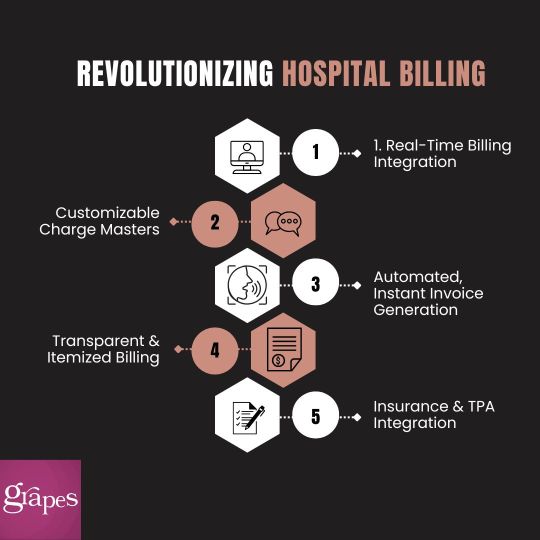
Hospital Billing Making it Easier through HMS Software | Grapes IDMR
0 notes
Text
Accelerating Hospital Efficiency Through Technology | The Case for HMS Software
The dynamic evolution of the healthcare sector underscores the critical need for efficient and scalable Hospital Management Systems (HMS). These cutting-edge systems empower healthcare organizations to optimize operations, elevate patient care, and enhance overall productivity. Grapes Innovative Solutions offers Grapes IDMR, a robust HMS software designed to streamline daily activities, foster scalability, and maximize operational efficiency for healthcare institutions. By integrating HMS software into their framework, hospitals can effectively address challenges and deliver superior-quality care to their patients.

Navigating Challenges with HMS Software in Healthcare
Healthcare organizations, whether small clinics or large hospitals, face a variety of challenges that hinder operational efficiency. These challenges often include managing large volumes of patient data, coordinating between multiple departments, and ensuring compliance with healthcare regulations. The traditional methods of managing hospital operations manually or using outdated systems can result in bottlenecks, errors, and delays in service delivery.
With the adoption of HMS software, hospitals can overcome these hurdles. Advanced HMS software like Grapes IDMR provides a centralized platform where all hospital operations, from patient registration to billing, are managed in one place. This not only reduces the chances of human error but also saves time and resources that would otherwise be spent on manual tasks. In addition, HMS software helps healthcare providers ensure patient safety, track medical histories, and streamline clinical workflows – all of which are crucial to offering the highest quality of care.
Key Challenges Addressed by HMS Software
Data Management: The amount of data that hospitals handle daily is enormous, including patient records, medical histories, treatment plans, and more. Managing this data manually is both time-consuming and error-prone. With HMS software, healthcare providers can store and access data securely, ensuring that patient information is always up-to-date and accurate.
Coordination Between Departments: Hospitals consist of multiple departments such as the emergency room, pharmacy, laboratory, and billing. These departments need to work in coordination to deliver timely patient care. HMS software offers an integrated system that facilitates smooth communication between departments, ensuring that all team members are on the same page when it comes to patient treatment plans.
Regulatory Compliance: Healthcare organizations must comply with strict regulations and standards, such as HIPAA (Health Insurance Portability and Accountability Act). Grapes IDMR and other advanced HMS software ensure that your hospital stays compliant with these laws by implementing secure data handling practices and generating reports that meet regulatory requirements.
Unveiling the Scalability Potential of HMS Software
As healthcare facilities grow in size and complexity, the need for scalable solutions becomes more apparent. Managing multiple departments, larger volumes of patient data, and expanding service offerings requires robust technology that can scale to meet these needs.
The scalability of HMS software is one of its most valuable attributes. Grapes IDMR, for example, is built with scalability in mind. Whether your hospital is a small practice or a multi-location healthcare network, the software adapts to your growing needs. Hospitals can expand their operations, add new services, and manage more data without compromising efficiency or security.
Benefits of Scalable HMS Software
Handles Increased Data Volume: As a hospital grows, so does the amount of patient and administrative data. Scalable HMS software can handle large datasets, ensuring that data management remains efficient, even as volumes grow.
Supports Expansion: For hospitals looking to expand, scalability is essential. HMS software like Grapes IDMR allows for easy integration with additional departments, locations, and service lines, making it easier for hospitals to scale operations without needing to switch to a new system.
Flexible User Access: As a healthcare organization grows, more users will need access to the system. Grapes IDMR provides flexible user management, allowing hospitals to add new users with different access levels based on their roles and responsibilities. This ensures that each user has the right level of access to the data they need to perform their tasks effectively.
Adaptable Features: Different healthcare organizations have unique requirements. Whether it’s specialized reporting, additional modules, or integration with other software, scalable HMS software can be customized to meet the specific needs of a growing hospital.
Enhancing Productivity through Innovative HMS Software
The ultimate goal of any healthcare facility is to improve patient outcomes, but this can only be achieved through enhanced productivity. HMS software plays a crucial role in improving hospital productivity by automating routine tasks, streamlining workflows, and ensuring better resource allocation.
In hospitals, time is of the essence. A small delay in processing a patient's information or providing treatment can have significant consequences. Grapes IDMR helps healthcare providers make the most of their time by automating administrative tasks like patient registration, billing, and appointment scheduling. This allows healthcare professionals to focus more on patient care rather than on administrative burdens.
Key Ways HMS Software Improves Productivity
Automated Administrative Tasks: Many administrative tasks in a hospital, such as scheduling appointments, billing, and patient registration, can be time-consuming. HMS software automates these tasks, freeing up staff to focus on patient care.
Efficient Resource Allocation: Grapes IDMR helps hospitals efficiently manage resources, such as medical staff, equipment, and rooms. By tracking these resources in real time, hospitals can allocate them where they’re needed most, improving efficiency and ensuring that patients receive timely care.
Enhanced Communication: HMS software ensures seamless communication between departments, staff members, and even patients. With all the information stored in one place, healthcare providers can quickly access and share information, reducing delays and improving coordination.
Real-Time Data Access: Having access to real-time data can significantly improve decision-making. HMS software allows healthcare providers to access patient data and operational reports in real-time, enabling faster and more informed decisions.
A Leading Edge in Hospital Management Systems
As healthcare technology continues to evolve, the role of HMS software in improving hospital management is more important than ever. Grapes IDMR is at the forefront of this evolution, providing innovative solutions that meet the needs of modern healthcare organizations. With its scalable, user-friendly, and productivity-enhancing features, Grapes IDMR is the ideal choice for hospitals looking to optimize their operations and improve patient care.
By choosing Grapes IDMR, hospitals gain access to an HMS software solution that is tailored to meet the unique challenges of the healthcare industry. Whether you are looking to improve scalability, enhance productivity, or ensure compliance, Grapes IDMR offers the tools and features necessary to succeed.
Conclusion
In an era of rapid technological advancements, healthcare organizations must adopt tools that support growth and efficiency. HMS software like Grapes IDMR is no longer a luxury but a necessity for hospitals aiming to scale their operations and enhance productivity. By providing centralized data management, scalable solutions, and tools to improve communication and efficiency, HMS software is transforming healthcare operations.
If you're looking for an innovative solution that will take your hospital management to the next level, Grapes IDMR is the answer. With its ability to streamline operations, improve data accuracy, and enhance patient care, Grapes IDMR is your trusted partner in hospital management.
To learn more about how Grapes IDMR can benefit your healthcare facility, visit: HMS Software
By leveraging HMS software, healthcare providers can optimize their operations, reduce administrative burdens, and focus more on what truly matters: delivering high-quality care to patients.
#HMSsoftware #GrapesIDMR #HospitalManagement #HealthcareTechnology #HealthTech #ScalableHMS #HospitalProductivity #HealthcareInnovation #MedicalSoftware #DigitalHealth #HealthIT #PatientCare #HospitalEfficiency #DataManagement #HealthcareSolutions #HospitalAutomation #TechInHealthcare #HealthcareSoftware #PatientManagement #HealthSystems #HealthcareProviders #MedicalData #HospitalOperations #GrapesHMS #HealthTechSolutions #HospitalManagementSoftware #EHR #HospitalGrowth #GrapesInnovativeSolutions
FAQ 1. What is Grapes IDMR HMS Software and how does it improve hospital management? Grapes IDMR HMS Software is an advanced hospital management system designed to streamline hospital operations. It integrates all functions, including patient management, billing, and scheduling, improving efficiency and patient care. 2. How does Grapes IDMR HMS Software enhance productivity in hospitals? By automating administrative tasks and providing real-time data access, Grapes IDMR HMS Software helps hospitals save time, allocate resources efficiently, and ensure seamless communication across departments, boosting overall productivity. 3. Is Grapes IDMR HMS Software scalable for growing healthcare facilities? Grapes IDMR HMS Software is highly scalable, making it ideal for hospitals of any size. It can expand with your facility’s needs, easily integrating new departments and managing increased data without compromising performance.
#HMSsoftware#GrapesIDMR#HospitalManagement#HealthcareTechnology#HealthTech#ScalableHMS#HospitalProductivity#HealthcareInnovation#MedicalSoftware#DigitalHealth#HealthIT#PatientCare#HospitalEfficiency#DataManagement#HealthcareSolutions#HospitalAutomation#TechInHealthcare#HealthcareSoftware#PatientManagement#HealthSystems#HealthcareProviders#MedicalData#HospitalOperations#GrapesHMS#HealthTechSolutions#HospitalManagementSoftware#EHR#HospitalGrowth#GrapesInnovativeSolutions
1 note
·
View note
Text
Common Challenges in HMS Software Implementation and How to Overcome Them

Implementing Hospital Management Software (HMS Software) is a complex undertaking that can present several challenges for healthcare organizations. However, with careful planning, effective communication, and strategic approaches, these challenges can be overcome to ensure a successful implementation. Let's explore some common challenges in HMS software implementation and strategies to address them:
1. Resistance to Change:
- Challenge: Healthcare professionals may resist adopting new HMS software due to unfamiliarity with the system, fear of disruption to workflows, or concerns about increased workload.
- Solution: Address resistance to change through comprehensive training programs, hands-on workshops, and user support resources. Engage key stakeholders early in the implementation process, solicit their input, and communicate the benefits of the new HMS software for improving patient care and streamlining operations.
2. Data Migration and Integration:
- Challenge: Migrating existing data from legacy systems and integrating HMS software with other healthcare systems can be challenging, leading to inconsistencies, compatibility issues, and workflow disruptions.
- Solution: Develop a robust data migration plan that includes data cleansing, mapping, and validation processes. Collaborate with IT teams and system vendors to ensure seamless integration between HMS software and other systems, such as electronic health records (EHR), laboratory information systems (LIS), and billing platforms.
3. Customization and Configuration:
- Challenge: Healthcare organizations may require customization and configuration of HMS software to align with their unique workflows, clinical protocols, and regulatory requirements.
- Solution: Work closely with HMS software vendors to understand customization options and configure the system to meet specific organizational needs. Prioritize essential features and functionalities, and avoid over-customization to minimize complexity and maintain system stability.
4. User Training and Adoption:
- Challenge: Ensuring that healthcare professionals and staff members receive adequate training and support to effectively use HMS software can be a significant challenge.
- Solution: Develop comprehensive training programs tailored to user roles and proficiency levels. Provide hands-on training sessions, online tutorials, and user manuals to familiarize users with the HMS Software interface, features, and functionalities. Encourage ongoing learning and feedback to support continuous improvement and user adoption.
5. Performance and Scalability:
- Challenge: HMS software performance issues, such as slow response times, system crashes, or scalability limitations, can hinder productivity and compromise patient care delivery.
- Solution: Conduct thorough performance testing and optimization exercises during the implementation phase to identify and address potential bottlenecks. Ensure that the HMS software infrastructure is scalable to accommodate future growth and increased user demand. Work closely with software vendors and IT teams to monitor system performance and implement necessary upgrades or enhancements as needed.
6. Regulatory Compliance:
- Challenge: Meeting regulatory compliance requirements, such as HIPAA (Health Insurance Portability and Accountability Act), GDPR (General Data Protection Regulation), and HITECH (Health Information Technology for Economic and Clinical Health), can pose challenges during HMS software implementation, particularly regarding data security and privacy.
- Solution: Ensure that HMS software vendors adhere to industry standards and regulatory data security and privacy guidelines. Implement robust security measures, such as encryption, access controls, and audit trails, to protect sensitive patient information. Conduct regular security assessments and audits to identify and mitigate compliance risks proactively.
By addressing these common challenges with careful planning, effective communication, and collaboration with key stakeholders, healthcare organizations can overcome obstacles and successfully implement HMS software to improve patient care, streamline operations, and achieve better clinical and financial outcomes.
0 notes
Text
Maximizing Efficiency: Integrating Hospital Software with IoT Devices
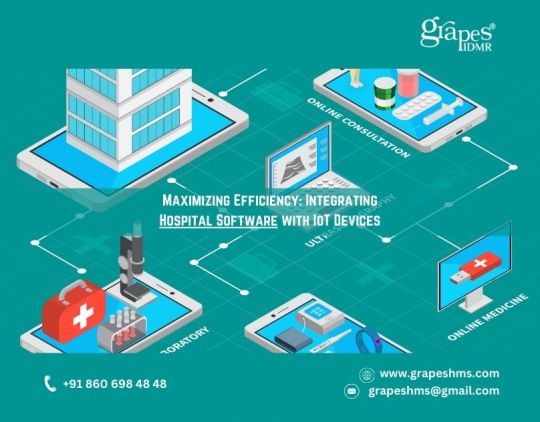
In today's rapidly evolving healthcare landscape, the integration of hospital software with Internet of Things (IoT) devices is revolutionizing patient care delivery, operational efficiency, and overall healthcare outcomes. By harnessing the power of IoT technology, healthcare organizations can maximize efficiency, streamline workflows, and enhance patient experiences. Let's explore the benefits and implications of integrating hospital software with IoT devices.
Real-Time Patient Monitoring:
Hospital software integrated with IoT devices enables real-time monitoring of patient vital signs, activities, and health metrics.
IoT sensors embedded in medical devices, wearables, and patient monitoring systems capture data continuously and transmit it directly to the hospital software platform.
Healthcare providers gain instant access to critical patient information, allowing for timely interventions, proactive care management, and improved clinical outcomes.
Enhanced Asset Management:
IoT-enabled hospital software facilitates the tracking and management of medical equipment, supplies, and assets within healthcare facilities.
RFID tags, sensors, and beacons embedded in equipment and inventory items enable automated asset tracking, location monitoring, and inventory management.
Healthcare organizations can optimize asset utilization, reduce equipment downtime, and minimize inventory stockouts by leveraging real-time data insights provided by IoT-integrated hospital software.
Improved Facility Operations:
Hospital software integrated with IoT devices streamlines facility operations and maintenance processes, leading to increased efficiency and cost savings.
IoT sensors deployed throughout healthcare facilities monitor environmental conditions, energy usage, and equipment performance in real-time.
Facility managers can proactively identify maintenance issues, optimize energy consumption, and ensure regulatory compliance by leveraging data-driven insights from IoT-enabled hospital software.
Remote Patient Care and Telemedicine:
IoT-integrated hospital software enables remote patient monitoring and telemedicine consultations, expanding access to healthcare services and improving patient engagement.
IoT-enabled wearable devices, home monitoring kits, and telehealth platforms facilitate virtual consultations, remote diagnostics, and medication adherence monitoring.
Healthcare providers can deliver personalized care plans, monitor patients' progress remotely, and intervene as needed, resulting in better health outcomes and reduced hospital readmissions.
Predictive Analytics and Preventive Care:
Hospital software integrated with IoT devices leverages data analytics and machine learning algorithms to predict and prevent adverse events and medical complications.
IoT sensors capture and analyze vast amounts of patient data, including physiological parameters, lifestyle factors, and environmental triggers.
Healthcare organizations can identify patterns, trends, and risk factors early on, enabling proactive interventions, personalized treatment plans, and preventive care strategies to improve patient health and wellness.
In conclusion, integrating hospital software with IoT devices offers tremendous potential for maximizing efficiency, improving patient care, and transforming healthcare delivery. By harnessing real-time data insights from IoT-enabled devices, healthcare organizations can enhance clinical workflows, optimize resource utilization, and deliver more personalized and proactive care to patients. Embracing IoT integration in hospital software is not just a technological advancement but a strategic imperative for driving innovation and achieving excellence in today's dynamic healthcare environment.
#HMS#hmssoftware#hospitalsoftware#HealthcareManagementsystem#Healthcare#HospitalManagementSystem#HospitalManagement#BSA#GrapesHMS#MIS#EMR#GrapesIDMR#Grapes#HealthcareManagementSystemsoftware#Software#SoftwareSolution#Doctor#PatientRegistration#IPDManagement#OPDManagement#IDMR#Labmanagement#NursingStation#Dietmanagement#MRDManagement#BloodBank#Linenmanagement#HRManagement#Pharmacy#Radiology
0 notes
Photo
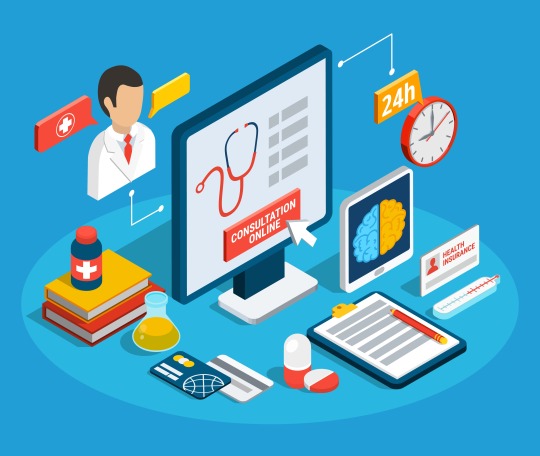
(via Unlocking the Potential of EMR Software for Modern Healthcare)
0 notes
Text
youtube
#connectinfosoft#hospitalsoftwaresystems#hmssoftware#healthcaremanagementsoftware#softwareforhealthcare#hospitalmanagementsystemsoftware#hospitalmanagementsystem#hospitalbillingsystemsoftware#hospitalmanagementsoftware#hospitalinformationsystemsoftware#healthcaresoftware#besthospitalmanagementsoftware#hmssoftwareforhospitals#hospitalitymanagementsoftwaresystems#hospitalbillingsoftware#hospitalsoftware#hospitalpatientmanagementsoftware#webdesign#webdesigningcompany#webdevelopment#webdevelopmentcompany#software#softwaredevelopment#softwaredevelopmentcompany#usa#india#facebook#pintrest#youtube#youtuber
1 note
·
View note
Text
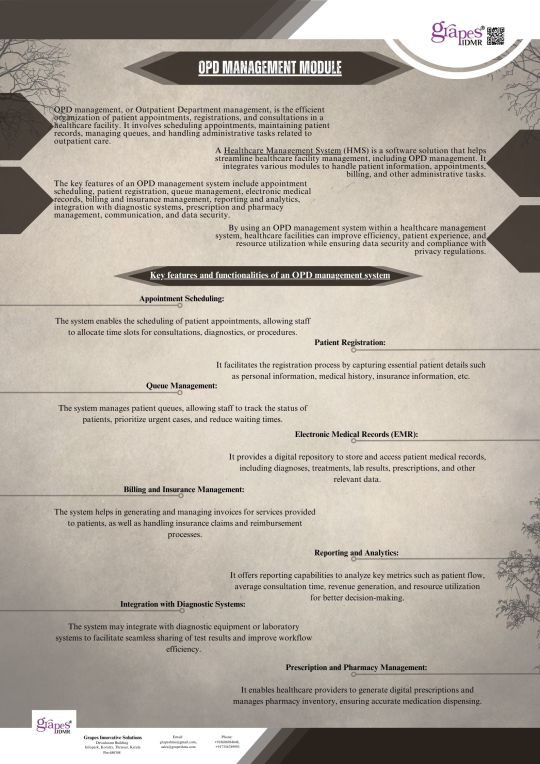
Outpatient department management, also known as outpatient Department management, is the effective processing and coordination of patient appointments, registration, and medical services in a healthcare facility's outpatient department. It entails expediting the entire patient journey, from registration to consultation, diagnostics, and treatment.
Healthcare management systems, which are comprehensive software solutions designed to support various administrative and clinical functions within a healthcare organization, include OPD management as a critical component. Technology is used in these systems to automate and optimize patient data administration, appointments, billing, inventories, and other elements of healthcare delivery.
#hms #healthcare #healthcaremanagement #healthcaremanagementsystem #hospitalmanagement #hmssoftware #hospitalmanagementsystem #Grapes #GrapesIDMR #Grapeshms #doctor #nurse #LabManagement #IPDManagement #BSA #MIS #EMR #IDMR #Pharmacy #Bloodbank #Pharmacy #OPDManagement #SoftwareSolution #Dietmanagement
#HealthcareManagementSystem
#GrapesIDMR
#HealthcareAutomation
#HospitalManagement
#EMRSoftware
#DigitalHealthcare
#MedicalInnovation
#HealthcareTechnology
#PatientCare
#HealthcareData
#InnovativeSolutions
#MedicalImageData
#HealthcareEfficiency
#HealthTech
#HealthcareRevolution
#AdvancedEMR
#HealthcareInnovation
#HospitalOperations
#HealthcareIT
#UserFriendlyInterface
#healthcare#hms#hospital management system#management#software#hospital#bsa#healthcare management system#health#idmr
0 notes
Text
Medassist Hospital Management Software is bringing by Bitwork Labs to provide one of the best platforms to maintain your hospital care and cure services around the clock. This is embedded with many modules management facilities that helps your hospital to deliver fast services.
More@ https://bit.ly/3S5st5p visit@ https://medassist.in/
0 notes
Photo
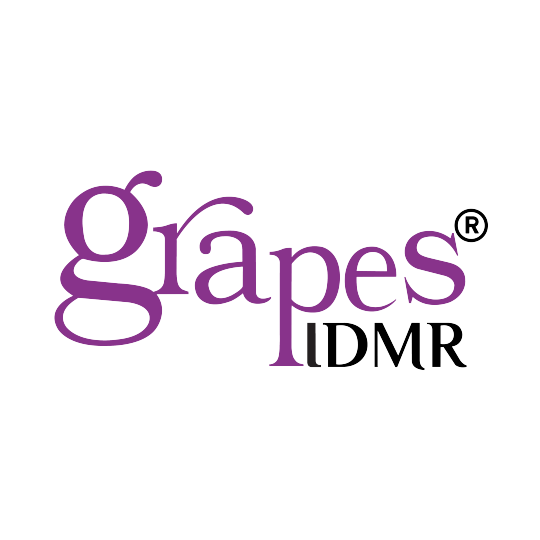
the Best Electronic Health Record Software in India | grapes idmr (on Wattpad) https://www.wattpad.com/story/385498617-the-best-electronic-health-record-software-in?utm_source=web&utm_medium=tumblr&utm_content=share_myworks&wp_uname=jeraldnepoleon The healthcare industry is undergoing a significant transformation, with technology playing a pivotal role in improving patient care, increasing efficiency, and reducing operational costs. One of the most important innovations in this revolution is the Best Electronic Health Record software, which has become a cornerstone for modern healthcare management. Among the various solutions available, Grapes IDMR, developed by Grapes Innovative Solutions, stands out as one of the most comprehensive and efficient Electronic Health Record (EHR) software in India...
#emrsoftware#grapesidmr#healthcare#hmssoftware#hospitalmanagementsoftware#jeraldnepoleon#software#books#wattpad#amwriting
2 notes
·
View notes
Text
Next-Gen HMS Software: Smart Control Over Hospital Operations
Explore how HMS software transforms hospital operations with automated billing, real-time dashboards, and integrated HR and inventory modules. From faster patient registrations to accurate financial reports and efficient staff scheduling, this system ensures smoother workflows and better decision-making. HMS software unifies every unit clinical, administrative, and financial on a single, intelligent platform. Whether it’s managing beds, prescriptions, or procurement, hospitals using HMS software gain real-time visibility and cost control. Learn how hospitals are reducing delays, preventing revenue leakage, and simplifying audits by implementing modern HMS systems. Discover why HMS software is a game-changer in healthcare delivery and hospital management.
Why Modern Hospitals Rely on HMS Software
Hospital Management Software (HMS) is no longer just a digital replacement for manual registers it’s the backbone of efficient, accountable healthcare. As hospitals scale in size and complexity, HMS software plays a pivotal role in connecting various departments, maintaining data transparency, and ensuring timely decision-making. With real-time automation, hospitals can minimize delays in diagnosis, avoid billing inconsistencies, and gain operational clarity across departments.
Digitalized Patient Care Flow
From the moment a patient registers, HMS software activates a connected care flow that eliminates redundant paperwork and manual coordination.
Streamlined Registration & Appointments:Patients are registered with a unique ID that ties all services from doctor consultations to discharge into one centralized record. Appointment scheduling is aligned with real-time doctor availability, reducing waiting times.
Integrated Prescriptions & Diagnostics:Doctors issue digital prescriptions, instantly forwarded to the in-house pharmacy. Any tests prescribed are logged and sent to the lab module. Once results are ready, they are auto-updated in the patient’s digital file accessible by both doctors and patients.
Efficient Inpatient Monitoring:Bed allocation, vitals tracking, OT schedules, and nursing records are managed digitally. Consent forms, medication timings, and discharge summaries are all generated without the need for physical documentation, ensuring error-free, real-time care.
Faster Billing & Discharge:All service records treatments, medicines, tests are automatically attached to the patient’s bill. This ensures a fully itemized invoice at discharge, speeding up exit time and eliminating billing disputes.
Built-In Financial Intelligence and Billing Accuracy
Financial departments in hospitals often face challenges like duplicate entries, under-reporting, or delayed revenue recognition. HMS software ensures accurate, real-time billing with minimal human input.
Every Charge Auto-Linked to Billing:Whether a medicine is issued, a lab test is booked, or a consultation is provided, the system automatically captures the charge. It reduces reliance on manual billing and ensures every service is accounted for.
Insurance & Discount Calculations Simplified:The software manages insurance claim processing, tracks pre-authorizations, and applies discounts without error. All balances and dues are updated instantly, keeping financial records transparent.
Daily Financial Reports & Analytic:
Generate reports such as daily revenue, uncollected bills, department-wise earnings, and claim statuse all in one click. Finance teams can analyze profitability, monitor trends, and simplify audits with clean, digital logs.
Smart Hospital HR and Inventory Modules
Behind every successful hospital is a team of professionals and well-managed resources. HMS software integrates HR management and inventory control to ensure seamless backend operations.
Complete HR & Duty Management:Staff profiles, leave approvals, attendance, and department allocations are handled digitally. Duty rosters are auto-scheduled based on availability, ensuring balanced staffing across shifts.
Inventory Oversight and Alerts:Real-time monitoring of consumables, medicines, and surgical supplies helps reduce wastage. HMS software provides expiry alerts, stock-out warnings, and automated reorder prompts to keep inventory under control.
Asset Tracking and Maintenance Logs:High-value equipment like MRI machines or ventilators are tagged within the system. Their usage history, service records, and maintenance due dates are stored for efficient asset lifecycle management.
Centralized Dashboards for Smarter Decisions
HMS software empowers hospitals with centralized dashboards designed to support every role within the facility whether it's a lab technician tracking diagnostic progress, a finance manager reviewing revenue summaries, or an administrator monitoring bed occupancy and departmental efficiency. These dashboards are configured with role-based access, meaning each user only views what’s relevant to their responsibilities. Doctors can see their consultation schedules, nurses manage patient medication charts, and pharmacists monitor issued medicines and pending refills. This structure enhances focus, reduces distractions, and minimizes information overload. The dashboards also provide real-time visibility across departments, eliminating the need for constant inter-department communication. For example, administrators no longer need to make calls to check ICU bed status or pending test reports they can view all such data instantly on the screen. This real-time access accelerates decision-making and improves hospital responsiveness.
Conclusion
HMS software is not just about digitization it’s about giving hospitals complete command over clinical, financial, and operational activities. By adopting an integrated system, hospitals reduce delays, improve patient care, and maintain accurate, accessible records. In today’s data-driven healthcare environment, a well-implemented HMS software is no longer optional it’s essential for success.
To learn how your hospital can benefit from intelligent automation and integrated workflows, Visit Grapes Innovative Solutions for tailored HMS software solutions.
Frequently Asked Questions
Can HMS software integrate with insurance providers?Yes, HMS software manages pre-approvals, claim submissions, and reimbursement tracking for insurance workflows.
How does HMS software support hospital inventory?It monitors medicine usage, stock levels, expiry dates, and triggers automated reordering to prevent shortages.
Is training required to use HMS software?Most HMS platforms offer user-friendly dashboards and onboarding support. Basic training is sufficient for hospital staff.
#hmssoftware#hospitalmanagement#ehrsolution#emrtools#patientcare#hospitalworkflow#digitalhospital#clinicautomation#hospitaladmin#opdflow#ipdmonitoring#billingautomation#inventorycontrol#medtech#smarthealthcare#pharmacymanagement#digitalrecords#revenuecycle#staffroster#labintegration#hospitaldashboard#assettracking#grapeshms#grapesinnovativesolutions#hospitalsoftware
0 notes
Photo

Are you planning to develop an on-demand Hospital management system app? So first understand the development cost, benefits, and modules that you must have in your application with this blog:- https://blog.techpathway.com/how-to-develop-hospital-management-system/
For more information:- https://www.techpathway.com/
0 notes
Text
A Comprehensive Comparison of Leading HMS Software Solutions
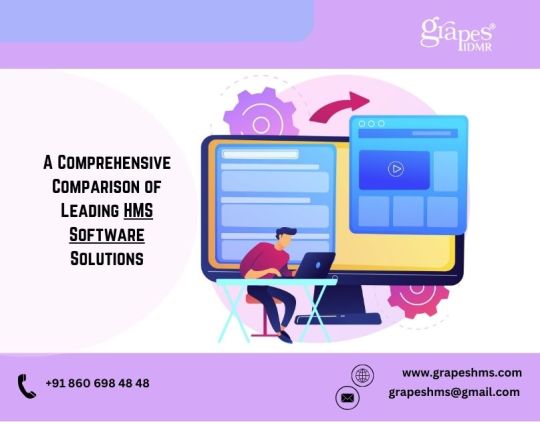
Choosing the best hospital management software (HMS software) for your healthcare organization is a crucial decision that requires careful evaluation of various factors. To assist you in this process, we have conducted a comprehensive comparison of leading HMS software solutions, highlighting their key features, functionalities, and benefits.
Epic Systems Corporation
Features: Epic offers a comprehensive suite of HMS software solutions, including electronic health records (EHR), patient scheduling, billing, and clinical decision support.
Functionality: Epic's software is highly customizable and scalable, catering to the needs of small clinics and large healthcare systems.
Benefits: Epic's HMS software is renowned for its interoperability, enabling seamless integration with other healthcare systems and facilitating collaborative care delivery.
Cerner Corporation:
Features: Cerner's HMS Software encompasses EHR, revenue cycle management, population health management, and telehealth capabilities.
Functionality: Cerner's software is known for its robust clinical decision support tools, data analytics capabilities, and patient engagement solutions.
Benefits: Cerner's HMS Software streamlines workflows, improves clinical outcomes, and enhances patient satisfaction through personalized care delivery and proactive population health management.
Allscripts Healthcare Solutions:
Features: Allscripts offers an integrated suite of HMS software solutions, including EHR, practice management, revenue cycle management, and patient engagement tools.
Functionality: Allscripts' software prioritizes interoperability, enabling seamless data exchange between disparate systems and enhancing care coordination across healthcare settings.
Benefits: Allscripts' HMS Software empowers healthcare organizations to deliver high-quality, patient-centered care, improve operational efficiency, and achieve better clinical and financial outcomes.
Meditech:
Features: Meditech provides a comprehensive suite of HMS software solutions, including EHR, patient registration, scheduling, billing, and clinical decision support.
Functionality: Meditech's software is designed to streamline clinical workflows, enhance patient safety, and optimize revenue cycle management through integrated, user-friendly interfaces.
Benefits: Meditech's HMS Software offers scalability, flexibility, and interoperability, enabling healthcare organizations to adapt to changing needs, improve care coordination, and achieve meaningful use of health IT.
NextGen Healthcare:
Features: NextGen offers a suite of HMS software solutions, including EHR, practice management, revenue cycle management, and population health management.
Functionality: NextGen's software prioritizes usability, interoperability, and data analytics, empowering healthcare organizations to drive better clinical and financial outcomes.
Benefits: NextGen's HMS Software enables healthcare organizations to optimize workflows, improve care quality, and enhance patient engagement through personalized, data-driven care delivery.
In conclusion, each of these leading HMS software solutions offers unique features, functionalities, and benefits to meet the diverse needs of healthcare organizations. When choosing the best HMS software for your business, consider factors such as interoperability, scalability, usability, and alignment with your organization's strategic objectives. By conducting a comprehensive comparison and selecting the HMS software solution that best fits your organization's needs, you can drive innovation, improve patient care, and achieve success in today's dynamic healthcare landscape.
#HMS#hmssoftware#hospitalsoftware#HealthcareManagementsystem#Healthcare#HospitalManagementSystem#HospitalManagement#BSA#GrapesHMS#MIS#EMR#GrapesIDMR#Grapes#HealthcareManagementSystemsoftware#Software#SoftwareSolution#Doctor#PatientRegistration#IPDManagement#OPDManagement#IDMR#Labmanagement#NursingStation#Dietmanagement#MRDManagement#BloodBank#Linenmanagement#HRManagement#Pharmacy#Radiology
0 notes
Text
Why Cloud Solutions are the Future of Hospital Software
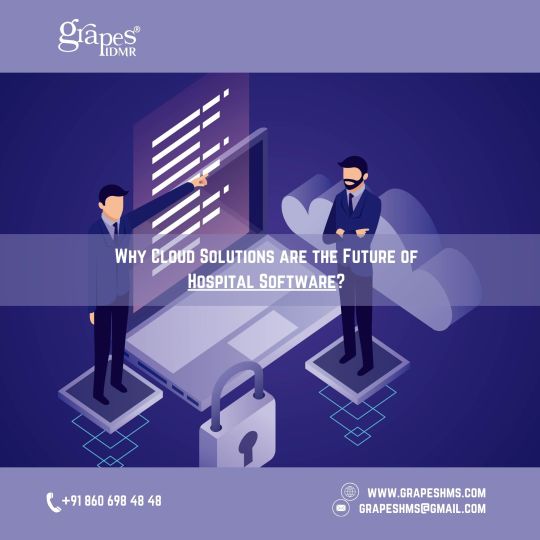
In today's rapidly evolving healthcare landscape, the adoption of cloud-based solutions is reshaping the way hospital software is deployed, managed, and utilized. Cloud solutions offer numerous advantages over traditional on-premises software, making them the future of hospital software. Let's explore why cloud solutions are leading the way in revolutionizing hospital software and driving innovation in the healthcare industry.
Enhanced Accessibility and Flexibility: Cloud-based hospital software provides healthcare organizations with unparalleled accessibility and flexibility. Unlike traditional on-premises solutions, which are limited to specific physical locations or devices, cloud solutions can be accessed from anywhere with an internet connection. This enables healthcare professionals to access patient information, collaborate with colleagues, and perform critical tasks from the hospital, clinic, or even remotely, improving workflow efficiency and responsiveness to patient needs.
Scalability and Agility: Cloud solutions offer unmatched scalability and agility, allowing healthcare organizations to scale their software infrastructure up or down based on changing needs and demands. Whether expanding services, adding new users, or integrating with additional systems, cloud-based hospital software can adapt quickly and seamlessly to accommodate growth and evolution. This scalability enables healthcare organizations to stay agile, responsive, and competitive in a dynamic healthcare environment without the constraints of traditional hardware limitations.
Cost-Effectiveness and Efficiency: Cloud solutions offer significant cost savings and operational efficiencies compared to traditional on-premises software deployments. With cloud-based hospital software, healthcare organizations can avoid hefty upfront investments in hardware infrastructure, software licenses, and IT personnel required for on-premises deployments. Instead, they can benefit from a pay-as-you-go subscription model, where they only pay for the resources and services they use, eliminating unnecessary expenses and reducing total cost of ownership over time.
Improved Security and Compliance: Contrary to common misconceptions, cloud solutions offer robust security measures and compliance capabilities that meet or exceed those of traditional on-premises deployments. Leading cloud providers invest heavily in state-of-the-art security technologies, data encryption, access controls, and compliance certifications to protect sensitive patient information and ensure regulatory compliance. By leveraging the expertise and resources of cloud providers, healthcare organizations can enhance data security, reduce risk, and maintain compliance with industry regulations such as HIPAA and GDPR.
Seamless Updates and Maintenance: Cloud-based hospital software eliminates the burden of manual updates, patches, and maintenance tasks typically associated with on-premises deployments. Cloud providers handle software updates and maintenance automatically, ensuring that healthcare organizations always have access to the latest features, enhancements, and security patches without disrupting operations. This seamless update process minimizes downtime, enhances system reliability, and enables healthcare organizations to focus on delivering quality patient care rather than managing IT infrastructure.
In conclusion, cloud solutions are the future of hospital software, offering unparalleled accessibility, scalability, cost-effectiveness, security, and efficiency compared to traditional on-premises deployments. By embracing cloud-based hospital software, healthcare organizations can unlock new opportunities for innovation, collaboration, and growth while enhancing patient care delivery and driving operational excellence in the digital age. Embracing cloud solutions is not just a technological upgrade but a strategic imperative for healthcare organizations looking to thrive in an increasingly interconnected and data-driven healthcare landscape.
#HMS#hmssoftware#hospitalsoftware#HealthcareManagementsystem#Healthcare#HospitalManagementSystem#HospitalManagement#BSA#GrapesHMS#MIS#EMR#GrapesIDMR#Grapes#HealthcareManagementSystemsoftware#Software#SoftwareSolution#Doctor#PatientRegistration#IPDManagement#OPDManagement#IDMR#Labmanagement#NursingStation#Dietmanagement#MRDManagement#BloodBank#Linenmanagement#HRManagement#Pharmacy#Radiology
0 notes
Link
A hospital management system is effective to manage hospital operations than manual work. This system has unique features which improve the capability to operate hospital operations fast and accurately.
0 notes
Text
youtube
#ConnectInfosoft#HospitalSoftwareSystems#HMSSoftware#HealthcareManagementSoftware#SoftwareForHealthcare#HospitalManagementSystemSoftware#HospitalManagementSystem#HospitalBillingSystemSoftware#HospitalManagementSoftware#HospitalInformationSystemSoftware#HealthcareSoftware#BestHospitalManagementSoftware#HMSSoftwareForHospitals#HospitalityManagementSoftwareSystems#HospitalBillingSoftware#HospitalSoftware#HospitalPatientManagementSoftware#Trending#Trendingshorts#Trendingvideo#saasdevelopment#saassoftware#mobileappdevelopment#software#webdesigningcompany#usa#india#Youtube
1 note
·
View note